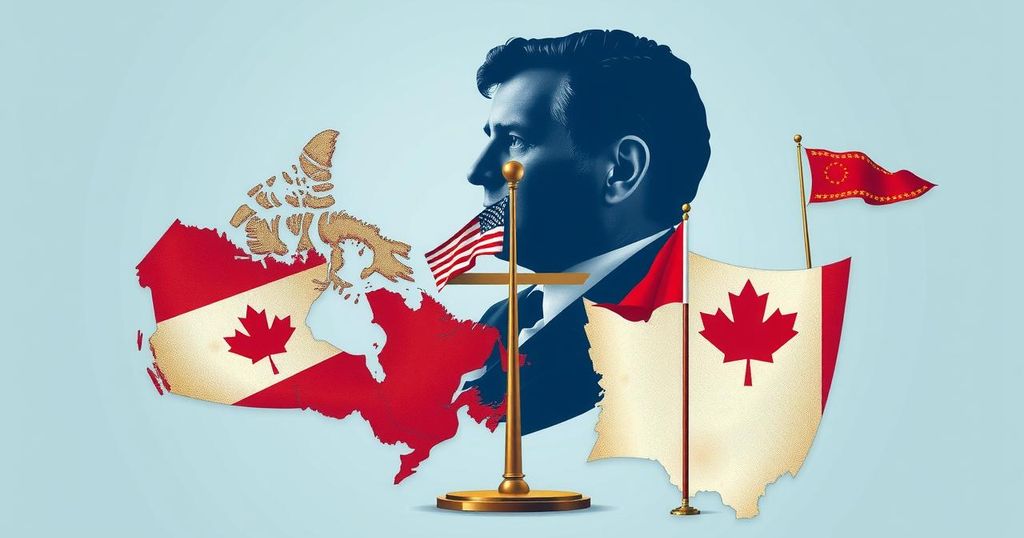The Influence of Donald Trump in Australian and Canadian Elections

In the lead-up to elections in Canada and Australia, conservative parties have seen their support dwindle significantly, largely due to the negative association with Donald Trump. Analysts observe that shifts in public sentiment reflect a broader anti-Trump sentiment impacting voter perceptions of leadership, sovereignty, and political strategy. Both parties must navigate these challenges as they approach election day.
In the upcoming weeks, voters in Canada and Australia will head to the polls, with significant implications for both nations. Initially, conservative parties in Canada, led by Pierre Poilievre, and Australia, under Peter Dutton, were expected to dominate. However, recent polling indicates a stark decline in support, positioning them behind their respective center-left incumbents.
Political analyst Ben Wellings from Monash University remarked on the intriguing parallel between the elections. He noted both Poilievre and Dutton are experiencing plummeting poll numbers, which he attributes partly to the challenges posed by former President Donald Trump. His influence appears to have reversed the momentum perceived after his initial election.
Polling trends in Australia highlight a dramatic decline for the Coalition, which had previously seen a resurgence earlier this year, overtaking Labor in popularity. However, after Trump’s inauguration and subsequent trade actions, support sharply declined by February. In Canada, conservatives transitioned from a significant lead to a trailing position by six points behind the ruling Liberal Party, influenced by Prime Minister Justin Trudeau’s strong stance against Trump.
Experts suggest that Trudeau’s response to Trump galvanized Canadian voters, reinforcing their national sovereignty. The political climate shifted after Trudeau’s departure when Mark Carney stepped in as Prime Minister, maintaining a firm stance against Trump, which contributed positively to Liberal support.
Criticism of Trump also surfaced among opposition leaders. Australian leader Peter Dutton faced backlash for praising Trump, linking him to plans for Gaza. Furthermore, senator Jacinta Price evoked Trump’s campaign slogan, raising eyebrows regarding the association with America’s divisive politics.
Antony Green, chief election analyst at ABC, indicated that while the impact of Trump is significant, it might not be as pronounced in Australia compared to Canada. He observed that Australian conservatives have attempted to adopt populist views. However, recent shifts toward centrism indicated a retreat from more extreme positions, contrasting with Canada’s more visceral experience with Trump’s policies.
Polling data reveals anti-Trump sentiment is considerable among Australian voters. Many indicate that Trump’s influence has deterred their support for Dutton, contrasting with Anthony Albanese. A Lowy Institute poll demonstrated that a vast majority of Australians express minimal trust in the United States, echoing concerns about their government’s relationship with the Trump administration.
This anti-Trump sentiment has manifested in public commentary where voters express their desire for Australian leadership to mirror Canada’s assertive stance against Trump’s policies. Observers like Dr. Chin attribute the emotional response in both countries to a perceived betrayal by a historically close ally, citing feelings of disappointment from having supported American leadership despite ethical reservations.
As election day approaches, the possibility of unexpected electoral outcomes remains. Nevertheless, there is déjà vu within the Conservative ranks in Canada, which has sparked critical introspection regarding their campaign’s trajectory. Strategist Kory Teneycke highlighted the severity of their poll decline as a failure in campaign management, emphasizing the necessity of understanding polling data in effective political strategy.
In conclusion, both Canadian and Australian political landscapes are being shaped significantly by Donald Trump’s legacy and actions. Voter sentiments reflect deepening discontent with the implications of his presidency on both nations’ conservatism, raising crucial questions about the future of conservative parties in the face of changing public opinion.
The upcoming elections in Canada and Australia illustrate the profound impact of Donald Trump on global conservatism. Polling trends indicate a shift away from conservative parties, attributed largely to anti-Trump sentiment and concerns over national sovereignty. Leaders Pierre Poilievre and Peter Dutton face challenges with their associations to Trump, which have adversely affected their standings. The evolving dynamics demand that conservative parties reassess their strategies in light of these sentiments and external influences.
Original Source: www.abc.net.au







